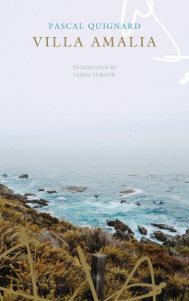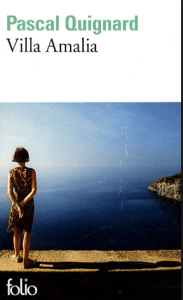

I’ve heard so many good things about Pascal Quignard that I finally had to read him. I had two of his books on my piles, Tous les matins du monde – All the World’s Monrnings and Villa Amalia, which will be published in English later this month. I finally decided to read Villa Amalia because I wasn’t in the mood for historical fiction.
At the beginning of the novel, the musician and composer Ann Hidden follows her boyfriend because she suspects he’s being unfaithful. She’s right and it hurts her terribly. While she does confront him, she’s not really interested in hearing what he has to say. Her mind is made up, she will leave her house, and everything else behind. She sells her house and all of her belongings, telling nobody but an old childhood friend who helps her to disappear. At first, she wants to tell her mother when she visits her in Brittany but their relationship is so tense, she only tells her she will travel.
Even though her childhood friend Georges knows what she’s doing, she also lies to him about her voyage. He thinks she’s in Africa, but she’s actually traveling first to Switzerland, where she stays in the Alps for a while, and then settles on the seaside in Southern Italy, on the island of Ischia. Here, she takes long baths and walks and begins to compose again. Ann has long abandoned giving concerts, she now dedicates her time solely to her own music and the transcription and reinterpretation of old masters, whose music she simplifies.
One day, on one of her walks, she sees a house high up on a hill and falls in love with the place. It’s a love and a longing so intense it seems strange that she feels this for a place and not a person. Villa Amalia has been abandoned for years and it’s not easy to track down the owners. She finds them eventually and is allowed to rent the house and renovate it. For the first time in her life, Ann Hidden is not only happy but has a sense of belonging somewhere. Later, she finds friends, a lover, and lives with a woman and a small child in great harmony until something terrible happens and she begins her wanderings again.
Villa Amalia is an astonishingly beautiful book. Ann Hidden is unlike any character I’ve come across in any book recently. If anything, she reminded me a bit of the one or the other character in Japanese fiction. She’s cold and distant but with a depth of feeling and a sense of beauty that makes her appealing. She carries wounds from her childhood that run very deep and explain why she’s cold and why she abandoned everything to try to find freedom.
The book beautifully explores several themes. The most obvious is how we deal with loss and abandonment. Another theme is life outside of what is considered conventional/normal. Ann finds nontraditional ways to interact and live with people. Every choice Ann makes is surprising because it’s a free choice. Most of us do or have to consider consequences, other people’s feelings, the future etc. Ann never does. She chooses the way that feels right to her at a given time. Another theme that is extremely important is creation. Or, more precisely, the creation of music. Where does music come from? Ann is a taciturn person who loves silence, yet she seems to have a well in her from which one melody after the other pours out.
I liked this book very much but it took me ages to finally review it because it’s so difficult to put into words why this is so beautiful or why I liked it so much. It’s a bit like with an elusive scent. It’s hard to describe it to someone else and explain why you like it.
I would have liked to share quotes but I’ve read this in French and the translation will only be out at the end of the month. I always find it a bit futile to do my own translations, when there is or will be an English version available.
Like All the World’s Mornings, Villa Amalia has been made into a movie starring Isabelle Huppert and one of my favorite actors Jean-Hughes Anglade. I hope to watch it soon.
